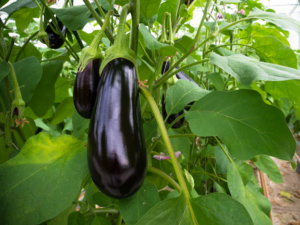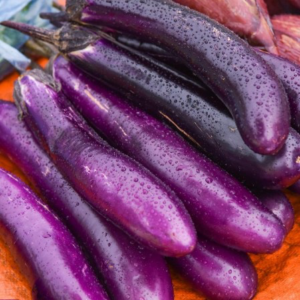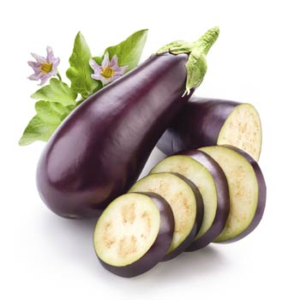"Gleaming skin; a plump elongated shape: the eggplant is a vegetable you'd want to caress with your eyes and fingers, even if you didn't know its luscious flavor.” — Roger Verge, founding father of nouvelle cuisine


Benefits and nutritional information:
- Eggplants have an impressive nutrient profile, rich in vitamins, minerals and powerful antioxidants.
- Being high in fiber and low in calories, they are a perfect for weight loss Eggplants are an excellent substitute for meat in vegetarian/vegan diets.
Starting:
- Eggplant optimally needs a long season of 80-plus degree days. In our area smaller fruited types will be more successful than the larger ones.
- To grow the heat-loving eggplant in our cool climate, it must be started indoors if using seeds.
- Seedlings need to be hardened off before planting outdoors.
When to plant:
- Ideally, seedlings will be held indoors until outdoor soil temperature has reached 65 degrees. Like its cousin the tomato, eggplants planted in soil that’s too cold are more prone to blossom end rot.
Thinning, training
- Space eggplant 24 to 36 inches apart.
- Eggplant should be staked to prevent them from toppling over.
- Or they can be grown in tomato cages or on a trellis
Signs of over-watering, nutrient deficiency
- While eggplant require a steady supply of moisture, they do not like soggy soil. Overwatering eggplant cause several problems including leaves that turn yellow and drop off; wilting of the entire plant; and fruit that is undersized, cracking, or showing blossom end rot.
Pests and pest controls
- Eggplant seedlings are vulnerable to verticillium wilt.
- Like their cousins, tomatoes, eggplant can be susceptible to blight
- Flea beetles are the worst of the insect pests
- Powdery mildew can quickly ruin your entire crop
- Blossom end rot is caused by a deficiency of calcium, but that deficiency could be either lack of the mineral in the soil or a problem with watering.
Harvesting
- Eggplant are ready to harvest when they have stopped growing and their skin becomes glossy.

- Mature eggplant will have soft, well-formed yet immature seeds when sliced open. Fruit with no visible seeds are not yet ripe and may taste bitter.
- Remove the fruit with shears or a knife, leaving a small portion of the stem attached.
Other resources and articles
- Good companion plants are beans, marigolds, peas, peppers, spinach, and thyme. Do not plant eggplants near fennel.

